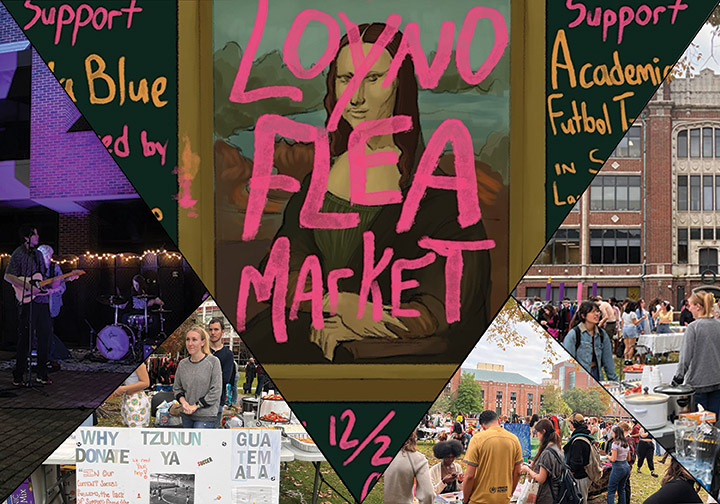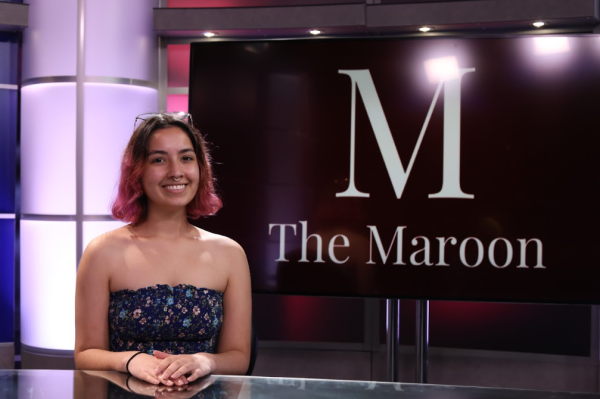SGA president vetoes flea market
Photos and art courtesy of Macie Batson and Adele Colson.
December 8, 2022
Adele Colson, a Loyola psychology senior and student government senator for the arts and sciences, was excited to begin planning Loyola’s Flea Market, in which students have an opportunity to sell their own work and fundraise for social causes. Colson said she assumed the event would become an annual tradition because last year’s flea market was “the largest (SGA) event of the year.”
She said this excitement vanished as Loyola’s Student Government Association President, Stephanie Oblena, vetoed Colson’s legislation, effectively eliminating SGA funding for the flea market.
Oblena said her reasoning behind her decision was based on her understanding that any profit made from the flea market would not be going directly back to the student population.
Oblena further said that the flea market “didn’t feel like a priority” because it would not directly benefit students.
Last year’s flea market served as a fundraising event for the student hardship fund, which donates money directly to students in need. This year, Colson planned on using the event to support both a recent Loyola graduate, named Ella Blue, dealing with extensive medical expenses, and an experimental course at Loyola, called “Futbol/Soccer: Cultural Texts and Contexts,” which focuses on supporting the Tzunun’ Ya’ Youth Soccer Academy in Guatemala.
“If there is going to be a profit, then it needs to go back to the students,” Oblena said. She further said that the flea market would not directly impact students because significant funds would be donated to the soccer academy rather than some aspect of the student body.
Disagreement on Funds
Colson said that she disagreed with this reasoning, as student artists would be able to profit directly from the sale of their work and funds raised by the sale of tables would go towards the student service learning project. Colson further said that last year’s flea market was very successful, and each student vendor made $200-$400 from selling their work.
According to Colson, her flea market bill asked for a $1,500 allocation and was passed unanimously in the student senate. Colson said that this bill was only struck down by Oblena’s veto. Additionally, Colson did not find out about this veto until two weeks after the fact, and roughly two hours before the next senate meeting. Colson further said that Oblena’s email informing the senate that the flea market bill had been vetoed did not include Oblena’s reasoning behind her decision to veto the bill.
“I had no room to make amendments, so that we could vote on it that night,” Colson said. She further said that, in this next senate session, several senators abstained from voting on the bill even though it had previously passed unanimously.
Colson said she found this especially shocking, as the previous flea market bill was written with the intention to create an annual event on campus.
“I was completely blindsided,” Colson said.
Oblena said that she was open to approving Colson’s legislation, if it was amended to more directly benefit students. For instance, Oblena said she suggested that the event’s profits go towards the Student Hardship Fund, as they did last year.
In response to this, Colson said that she offered a revised version of the bill which would lower the cost of renting tables, effectively lowering the amount of money donated to the soccer academy. Oblena, once again, vetoed this bill because she failed to see how the event would directly benefit students.
“I am confused,” Colson said, as she had previously been told during SGA meetings that they had around $2,000 left in the budget for the fall 2022 semester, and were looking to use that money before the semester ended.
A Perceived Lack of Transparency
After the flea market bill was vetoed for a second time, SGA sent out an email which read that they no longer had the funds to support this event, as they had only $200 left in the budget.
Colson also said that during this time period, Oblena was able to pass four pieces of legislation.
Colson further said that there is an overall lack of transparency with SGA’s budget, and it is difficult for senators to know exactly how funds are being spent. Colson said she has since asked SGA’s leadership to use a line item budget, in which each monetary allocation is clearly laid out to ensure future clarity.
“The budget right now is not comprehensive,” Colson said. “Because there is no line item.”
According to Oblena, SGA’s budget was lower for the fall of 2022 compared to previous semesters. Oblena said that the decrease in the budget is a result of overall low enrollment.
Colson said that the lack of organization, specifically within SGA’s budgetary allocations, makes her less inclined to continue working within student government, especially because senators are not paid for their work and contributions.
“It made me question, ‘is this really what I want to do?’” Colson said.
This lack of clarity is specific to the new SGA administration, Colson said. She said that in the past she felt that it was much clearer how money was being spent.
Oblena credited this lack of clarity to a general misunderstanding of how allocation within SGA works. She added that both she and her vice president, Viviana Alvarez, have taken a pay cut in order to help even out SGA’s budget.
Colson said that the whole situation is reflective of an overall lack of representation for arts students, and student artists, within SGA.
“Thrown into it”
Colson is not alone in this feeling. Chloe Bernier, a Loyola junior double-majoring in mass communication and music industry studies, also feels that there is a lack of representation of the arts in SGA, specifically as it pertains to student musicians.
“I went into it wanting to do something for the school of music and media,” Bernier said about her decision to join SGA this past semester.
She said a part of her goal was to expand the music industry studies program into a broader entertainment studies program.
“I feel like I was thrown into it without much support,” Bernier said.
In the past semester she said she has not had the opportunity to present any of the legislation she initially joined SGA to pursue.
Bernier saw the flea market as an opportunity for all arts students, including students involved in both visual arts and music, as last year the flea market offered a venue for music students to perform and gain an audience.
Oblena acknowledged that musicians and artists have less representation in SGA, when compared to other areas of study. She also said that her administration is exploring ways to boost arts involvement in student government, but it can be difficult as often these students, particularly musicians, are very busy and have many competing time commitments.
Colson, along with other organizers, were able to receive funding from the Loyno Costume Shop which allowed them to hold the flea market on Dec. 2, 2022.
Colson described the recent flea market as “a smashing success!”
She added that the event served the entire community, by giving everyone a place to support each other and meaningful social causes.
“I’ll be graduating in the spring and hope that with enough support we can leave the legacy of Loyno Flea Market for future generations,” she said.
Oblena said there is certainly a need for more events which showcase the arts.
“I’ve definitely seen the need for these events on campus, I just think there are different ways to go about it,” she said.
Macie Batson and Patrick Hamilton contributed to this report.









